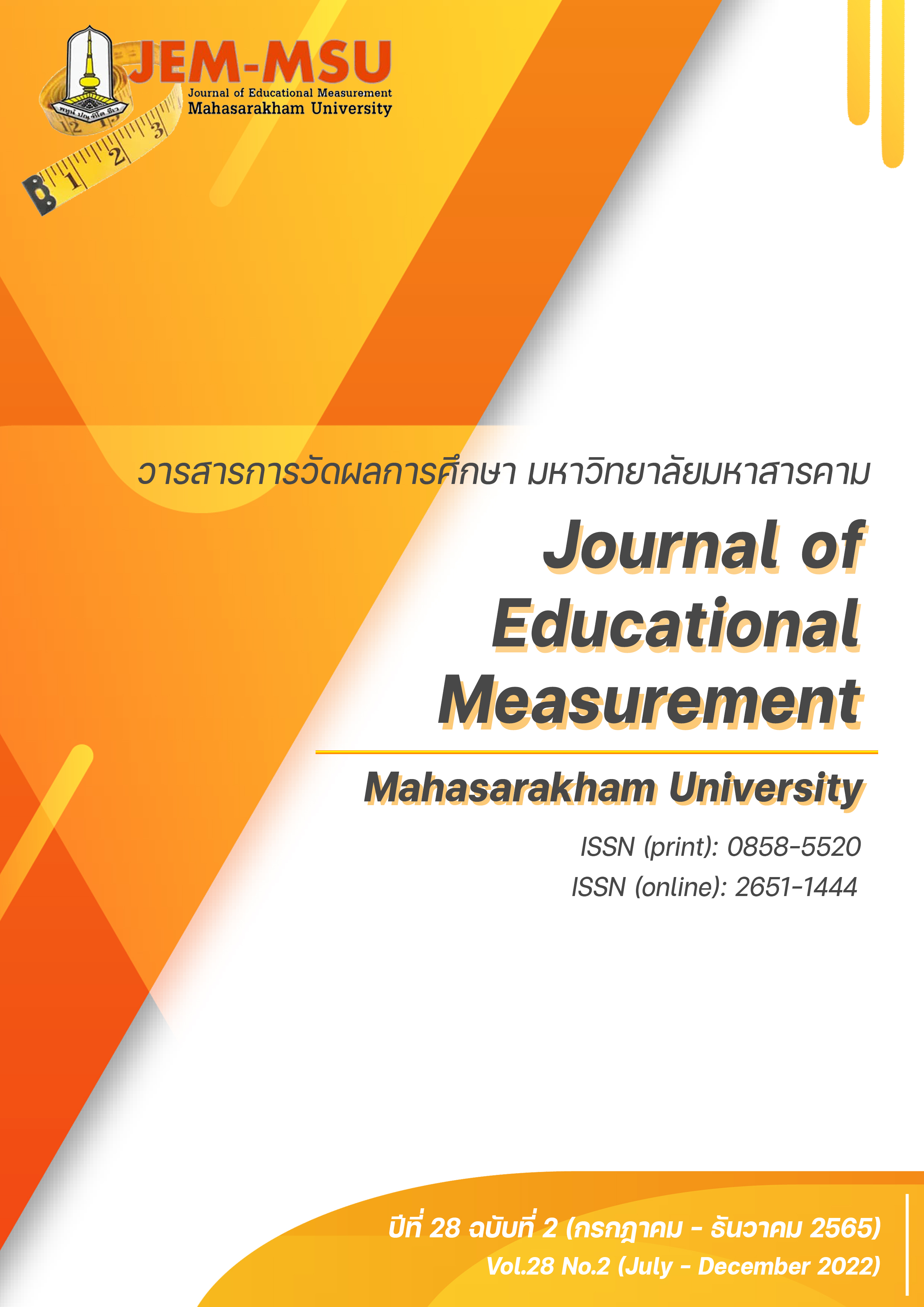Data Analysis in Polytomous Item Response Theory Using R
Main Article Content
Abstract
Item Response Theory (IRT) can be divided into two distinct categories based on the result of the response—Dichotomous IRT and Polytomous IRT. In educational testing contexts, polytomous scoring methods such as rating scales, rubrics, and partial credit scoring are used. This article then focuses on how to analyze data with the Partial Credit Model (PCM) and the Graded Response Model (GRM), which are models that cover quality examination of polytomous scoring tools generally used in the educational context through R. R is a well-known open-source program and is accepted by the public. It could be downloaded for use and for further development for free. In addition, it can be used in various operating systems. In the paper, we discuss the basics of the IRT, polytomous IRT models, R functions, and the analysis for PCM and GRM in educational measurement, psychological assessment, and so on.
Article Details

This work is licensed under a Creative Commons Attribution-NonCommercial-NoDerivatives 4.0 International License.
The content and information contained in the published article in the Journal of Educational Measurement Mahasarakham University represent the opinions and responsibilities of the authors directly. The editorial board of the journal is not necessarily in agreement with or responsible for any of the content.
The articles, data, content, images, etc. that have been published in the Journal of Educational Measurement Mahasarakham University are copyrighted by the journal. If any individual or organization wishes to reproduce or perform any actions involving the entirety or any part of the content, they must obtain written permission from the Journal of Educational Measurement Mahasarakham University.
References
Adams, R. J. (2005). Reliability as a measurement design effect. Studies in Educational Evaluation, 31, 162-172. https://doi.org/10.1016/j.stueduc.2005.05.008
Embretson, S. E., & Reise, S. P. (2000). Item response theory for psychologists. Lawrence Erlbaum Associates Publishers.
Freeman, D., Loe, B. S., Kingdon, D., Startup, H., Molodynski, A., Rosebrock, L., Brown, P., Sheaves, B., Waite, F., & Bird, J. C. (2021). The revised Green et al., Paranoid Thoughts Scale (R-GPTS): Psychometric properties, severity ranges, and clinical cut - offs. Psychological Medicine, 51(2), 244–253. https://doi.org/10.1017/s0033291719003155
Nering, M. L., & Ostini, R. (2011). New Perspectives and Applications. In M. L. Nering & R. Ostini (Eds.), Handbook of polytomous item response theory models (pp. 3-20). Routledge.
Satici, B., Gocet-Tekin, E., Deniz, M. E., Satici, S. A. (2020). Adaptation of the fear of COVID-19 scale: Its association with psychological distress and life satisfaction in Turkey. International Journal of Mental Health and Addiction. https://doi.org/10.1007/s11469-020-00294-0
van der Linden, W. J. (2016). Handbook of item response theory, volume one: Models. Chapman & Hall/CRC.
Weiss, S., & Roberts, R. D. (2018). Using anchoring vignettes to adjust self-reported personality: A comparison between countries. Frontiers in Psychology, 9. https://doi.org/10.3389/fpsyg.2018.00325
Chianchana, C. (2009). Multidimensional analysis. Journal of Education Khon Kaen University, 32(4), 13-22. (in Thai)
Chaimongkol, N., & Kanjanawasee, S. (2020). The application of R programming for educational testing. Journal of Research Methodology, 33(1), 21-45. https://portal.edu.chula.ac.th/pub/jrm/index.php/jrm/article/view/648. (in Thai)
Lekhawatthanapong, N. (2017). A comparison of partial knowledge scoring method quality: A development of modified number right–elimination scoring method [Master’s Thesis]. Chulalongkorn University Intellectual Repository (CUIR). http://cuir.car.chula.ac.th/handle/123456789/59866 (in Thai)
Pinitsakul, P., Senarat, S., & Senarat, B. (2020). Item response theory and testlet test. Ubon Ratchathani Journal of Research and Evaluation, 9(2), 74-84. https://so06.tci-thaijo.org/index.php/ubonreseva/article/view/243461 (in Thai)
Suksawang, P. (2013). The Basics of Structural Equation Modeling. Princess Naradhiwas University Journal, 6(2), 136-145. (in Thai)
Kanjanawasee, S. (2005). Classical test theories (5th Ed.). Chulalongkorn University Press. (in Thai)
Kanjanawasee, S. (2020). Modern test theories (5th Ed.). Chulalongkorn University Press. (in Thai)
Sakolkijrungroj, S. (n.d.). Polytomous item response theory models for affective variables. https://www.stou.ac.th/Offices/ore/info/cae/viewkb.aspx?id=291. (in Thai)
Sakworawit, A. (2017). Descriptive statistics, exploratory data analysis, and statistical graphic with basic R Programming. Chulalongkorn University Press. (in Thai)


